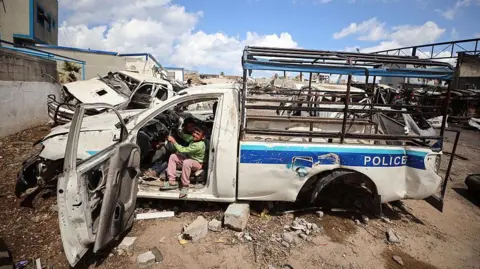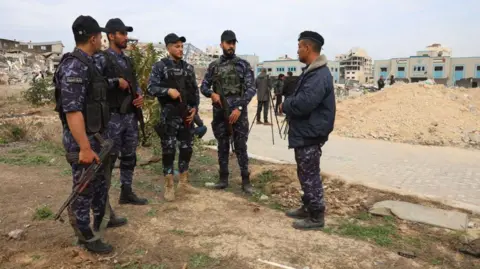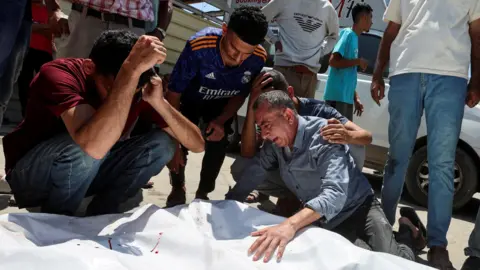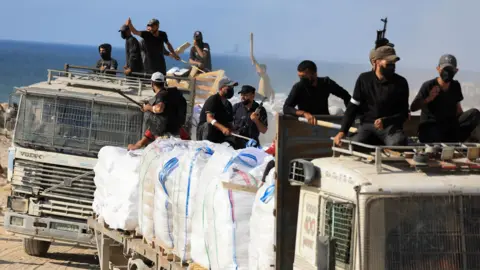Hamas security officer says group has lost control over most of Gaza
 NurPhoto via Getty Images
NurPhoto via Getty ImagesA senior officer in Hamas's security forces has told the BBC the Palestinian armed group has lost about 80% of its control over the Gaza Strip and that armed clans are filling the void.
The lieutenant colonel said Hamas's command and control system had collapsed due to months of Israeli strikes that have devastated the group's political, military and security leadership.
The officer was wounded in the first week of the war, which began after the Hamas-led attack on Israel on 7 October 2023, and has since stepped away from his duties for health reasons.
He shared several voice messages with the BBC on condition of anonymity.
In the messages, the officer painted a picture of Hamas's internal disintegration and the near-total collapse of security across Gaza, which the group governed before the conflict.
"Let's be realistic here - there's barely anything left of the security structure. Most of the leadership, about 95%, are now dead... The active figures have all been killed," he said. "So really, what's stopping Israel from continuing this war?"
"Logically, it has to continue until the end. All the conditions are aligned: Israel has the upper hand, the world is silent, the Arab regimes are silent, criminal gangs are everywhere, society is collapsing."
Last September, Israel's then-defence minister declared that "Hamas as a military formation no longer exists" and that it was engaged in guerrilla warfare.
According to the officer, Hamas attempted to regroup during the 57-day ceasefire with Israel earlier this year, reorganizing its political, military, and security councils.
But since Israel ended the truce in March, it has targeted Hamas's remaining command structures, leaving the group in disarray.
"About the security situation, let me be clear: it has completely collapsed. Totally gone. There's no control anywhere," he said.
"People looted the most powerful Hamas security apparatus (Ansar), the complex which Hamas used to rule Gaza.
"They looted everything, the offices - mattresses, even zinc panels - and no-one intervened. No police, no security."
 Anadolu via Getty Images
Anadolu via Getty ImagesThe officer said a consequence of the security vacuum was gangs or armed clans were "everywhere".
"They could stop you, kill you. No one would intervene. Anyone who tried to act on their own, like organising resistance against thieves, was bombed by Israel within half an hour.
"So, the security situation is zero. Hamas's control is zero. There's no leadership, no command, no communication. Salaries are delayed, and when they do arrive, they're barely usable. Some die just trying to collect them. It's total collapse."
On 26 June, at least 18 people were killed when an Israeli drone strike targeted a plainclothes Hamas police unit attempting to assert control over a market in Deir al-Balah, accusing vendors of price gouging and selling looted aid, witnesses and medics said.
The Israeli military said it struck "several armed terrorists" belonging to Hamas's Internal Security Forces.
 Reuters
ReutersIn this vacuum, six armed groups affiliated with powerful local clans have emerged as serious contenders to fill the void, according to the officer.
These groups have access to money, weapons and men, and are active across all of Gaza, but mostly in the south.
One of them is led by Yasser Abu Shabab, a figure who has attracted attention from the Palestinian Authority, which is based in the occupied West Bank and is a rival to Hamas, as well as regional players - particularly after Israel confirmed last month that it was supplying him with weapons.
The officer confirmed that Hamas had placed a large bounty on Abu Shabab's head, fearing he could become a unifying figure for its many enemies.
"Hamas would ignore ordinary thieves. People are hungry and [the fighters] don't want to provoke more chaos. But this guy? If the Hamas fighters find him, they might go after him instead of Israeli tanks."
Sources in Gaza told the BBC that Abu Shabab was working to co-ordinate with other armed groups to form a joint council aimed at toppling Hamas.
 Reuters
ReutersA retired Palestinian security official, who was part of the force that cracked down on Hamas's military wing in 1996 following a wave of bombings in Israel, said Abu Shabab's network was gaining traction.
"Abu Shabab's group is like an orphaned child who everyone will want to adopt if he succeeds in undermining Hamas rule," said the official, who now lives in Cairo.
"Publicly, all sides deny links to the armed groups in Gaza. But Abu Shabab has met a senior Palestinian intelligence officer three times and sent messages of assurance to the Egyptians through relatives in Sinai," he claimed.
He also said Abu Shabab "maintains good ties with Mohammad Dahlan's camp". Dahlan is a former Gaza security chief who has lived in exile since he fell out with Palestinian Authority President Mahmoud Abbas 15 years ago.
The Hamas security officer warned the group was "willing to do anything" to eliminate Abu Shabab not because of his current military strength, but out of fear he could become a symbol around which all of Hamas's adversaries rally.
"For 17 years, Hamas made enemies everywhere. If someone like Abu Shabab can rally those forces, that could be the beginning of the end for us."
As Gaza is plunged further into lawlessness, with entire neighbourhoods descending into gang rule, Hamas finds itself not just under Israeli fire but increasingly surrounded by rivals from within.
